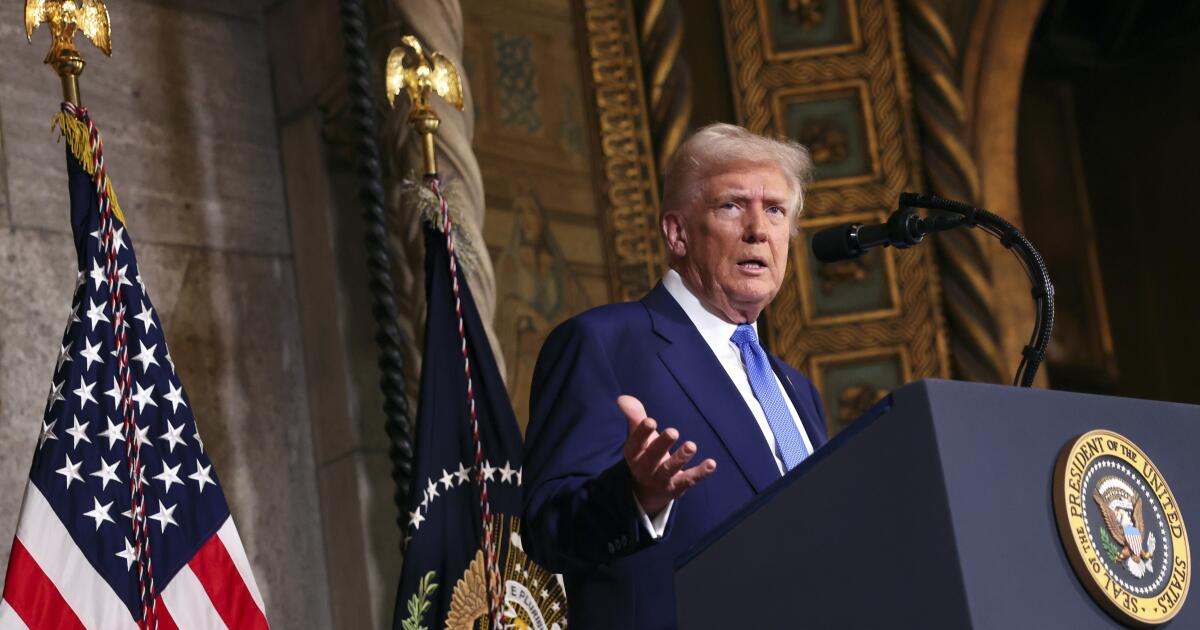WASHINGTON — The Trump administration is formally designating eight Latin American crime organizations as “foreign terrorist organizations,” upping its pressure on cartels operating in the U.S. and on anyone aiding them.
The move, carrying out a Jan. 20 executive order by President Trump, names Tren de Aragua in Venezuela, MS-13 in El Salvador and six groups based in Mexico. The designation will be published in Thursday’s edition of the Federal Register, according to a notice Wednesday.
Trump, a Republican, has made securing the U.S.-Mexico border among his top priorities, vowing to carry out mass deportations, sending active duty troops to the border and reaching deals with some countries to take in more migrants.
The “foreign terrorist organization” label is unusual because it deploys a designation normally reserved for groups like Al Qaeda or Islamic State that use violence for political ends — not for money-focused crime rings such as the Latin American cartels.
The Trump administration argues that the international connections and operations of the groups — including drug trafficking, migrant smuggling and violent pushes to extend their territory — warrant the designation.
Critics of the move call it unnecessarily broad and harsh and warn it could damage relations and paralyze trade with Latin America. Businesses, banks and buyers could fear possible U.S. prosecution if they knowingly or unknowingly have any transactions that touch the world of the cartels.
Such cartels permeate Mexico’s economy, dealing not only in drug trafficking and migrant smuggling but in fighting for control of the multibillion-dollar avocado business.
Aid groups say some past U.S. designations of criminal enterprises as terrorist organizations have threatened overall food imports into countries, for example, by making shipping companies fearful that U.S. prosecutors may accuse them of directly or indirectly supporting the targeted groups.
Mexican President Claudia Sheinbaum said Wednesday before the designations were published that “if that decree has to do with extraterritorial actions [in Mexico], those we do not accept.”
But she said Mexico was in agreement on the need to advance joint investigations.
“If they make this decree to investigate even more in the United States the money laundering and the criminal groups that operate in the United States, that carry out those drug sales, it’s very good,” Sheinbaum said. “What we do not accept is the violation of our sovereignty.”
Trump over the years has singled out two of the groups — MS-13 and Tren de Aragua — in political speeches and other appearances.
U.S. authorities say Tren de Aragua poses a threat in various U.S. cities. Trump and his allies have seized on the gang’s presence and made it the face of the alleged threat posed by migrants.
In his first term, Trump similarly pointed to MS-13 as a risk of immigration. But the violent street gang originated in Los Angeles in the 1980s, in communities made up largely of refugees from El Salvador’s civil war and other immigrants, and grew to include many U.S. citizens. The gang is known for brutality and street-level drug sales.
The six Mexico-based groups designated as terrorist groups include the Sinaloa cartel, Mexico’s oldest criminal group, which traffics drugs, weapons and people.
One of Sinaloa’s most lucrative businesses in recent years has been the production of fentanyl, blamed for tens of thousands of overdose deaths each year in the U.S. Sinaloa imports the precursor chemicals from China, produces the drug and then smuggles it across the border.
The other cartels targeted by the U.S. are Jalisco New Generation, Gulf, Northeast, La Nueva Familia Michoacana and United.
Knickmeyer and Verza write for the Associated Press. Verza reported from Mexico City.
